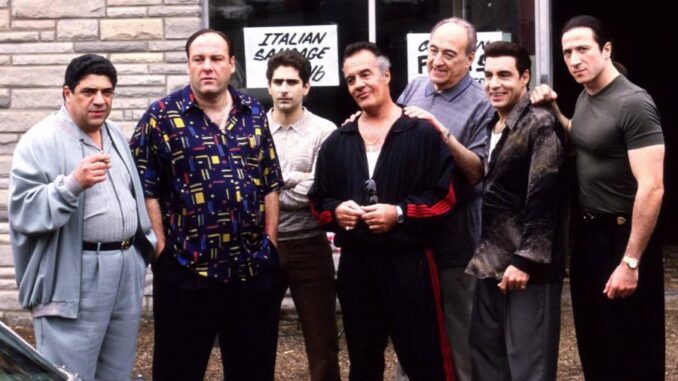
Alex Gibney’s new documentary spotlights showrunner David Chase and celebrates an unquestionable Jersey pride
The Sopranos got a lot of hate in its early days. Several major networks rejected the series that would later earn countless “best TV show ever” titles, with some critics questioning why it was set in New Jersey. David Chase, the Jersey-raised showrunner at the center of the new documentary Wise Guy: David Chase and The Sopranos, was put in the familiar position of needing to defend the Garden State as a perfect location for his mob show, instead of the overplayed New York.
Recalling the rocky start to director Alex Gibney in the film that premiered on HBO earlier this month, Chase remembered one critic in particular: Martin Scorsese. “‘I don’t get it, all these trees and s—,’” Chase recalls Scorsese saying, in the film. (In a 2019 interview, the director explained that he didn’t identify with the legendary series’ portrayal of mob culture.)
Filming the violent drama in bucolic suburbs like North Caldwell, where titular character Tony Soprano lived, made complete sense to Chase — and HBO agreed. “I knew there was a mob presence in New Jersey, kids whose fathers were heavy bookmakers, loan sharks,” he continued. “Where the Soprano house was, that was the town that we moved to when I was in eighth grade. There was a lot of woods and ponds — at the same time, some guy got blown up in his garage. Started his car, boom.”
“The most interesting thing to me was how personal this story was to David, and ultimately, in a kind of a roundabout way, for all of the other writers, particularly revolving around mommy issues,” Gibney told The Inquirer. “It came from a deeply self-reflective and honest place.”
After 25 years dominating award shows and ratings, The Sopranos remains an unforgettable portrait of the state, capturing sites like Atlantic City’s Boardwalk, the Pine Barrens, and the turnpike. “I forbade any exterior shots to be shot any place but New Jersey, because I wanted it to be realistic,” Chase said.
The most realistic part for Chase was Tony Soprano’s mother, Livia — a character he based on his own Italian American mother. Chase had a notoriously challenging relationship with his mother and for years, the screenwriter’s friends said he should write about her. From there sprouted the idea: What if her son was a mob boss? And his difficult, oppressive mother tried to have him killed?
The showrunner’s real-life connections to the story were what intrigued director Gibney the most when he considered making Wise Guy. Having lived in Summit, N.J., for years, Gibney himself was all in on the show’s Jersey identity.
In part one of the documentary, Gibney focuses on the origins and pilot episode while part two examines the legacy of star James Gandolfini (who died in 2013) and the show’s controversial finale. It includes interviews with Edie Falco (Carmela Soprano), Lorraine Bracco (Dr. Jennifer Melfi), former HBO head Chris Albrecht, and early writers Robin Green and Frank Renzulli.
Gibney began the filmmaking with an extensive interview with Chase lasting more than eight hours on the recreated set of Tony Soprano’s therapist’s office — with Gibney in Dr. Melfi’s chair and Chase in Soprano’s.
“He almost walked off within the first few hours of the interview,” said Gibney. “That would have been problematic, since we hadn’t even gotten to talking about The Sopranos.”
Chase thankfully stayed on and provided insights into the show’s casting and writing process. Audition clips in the film show a young Michael Imperioli — initially skeptical of the series because he thought Chase wasn’t Italian — who went on to play Christopher Moltisanti. Drea de Matteo (Adriana La Cerva) and Steven Van Zandt’s (Silvio Dante) auditions make an appearance, too.
Chase initially eyed Van Zandt for the role of Tony Soprano. “I said I’m not an actor, isn’t that kind of a prerequisite for this TV thing?” Van Zandt told Gibney, laughing. HBO told Chase that Bruce Springsteen’s longtime guitarist was too inexperienced to lead, so the showrunner created a new character just for him.
That’s when Gandolfini came into the picture. The documentary flashes clips of the would-be Tonys reciting his rant from the pilot about the perils of therapy: “Whatever happened to Gary Cooper? The strong, silent type. That was an American. He wasn’t in touch with his feelings, he just did what he had to do.”
Gandolfini struggled in his first audition and walked out of it midway. But Chase already knew he was right for the role. Gibney resurfaces archived interviews with Gandolfini to include his voice in the film as he unpacked the severe toll the show took on the actor. He would forgo sleep and drink coffee to prepare for violent scenes as he struggled with alcoholism and drug addiction.
“He felt that he had to go to places, [Gandolfini] said, that were destructive to him and painful for him,” Chase says in the film. “You might say — and I’m not sure about this — maybe there was more Tony there than he wanted to admit. That it was too easy for him.”
That question of who most embodied the dark, complicated, furious Tony Soprano remains present throughout the film, not just for the actor who played him but for the writer who made him.
“What was interesting about [Wise Guy] was to chart, over time, a three-way relationship between David, Jim, and Tony — a fictional character, but he was definitely the ghost that haunted the room for both of them,” said Gibney.
Much like The Sopranos, the documentary doesn’t offer any clean resolutions, but it provides a new spotlight on Chase that can help fans better understand the show and its undeniable Jersey roots.
“Wise Guy: David Chase and The Sopranos” is streaming on Max.
